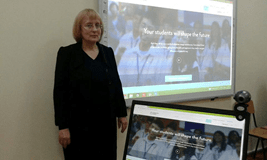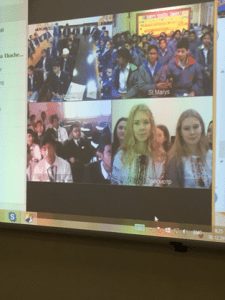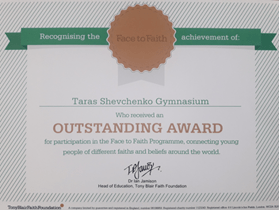By Nataliia Tkachenko
I am a full-time English teacher at Taras Shevchenko Himnazia, Kropyvnytskyi, Ukraine. It is a state school that combines primary, middle and high school that is common practice in Ukraine.
To begin with, I should say that to be a teacher in Ukraine, one has to have either a Bachelor’s or Master’s degree. Every 5 years teachers are supposed to do a course of professional development provided by the state regional teacher-developments institutes, to master their skills and acquire some new knowledge.
It is possible to do alternative training besides that mentioned above, either online webinars, conferences, etc., but until recently, these were not taken into account nor influenced any pay rises. From September 2018, a new system of teacher development will be introduced by the Ministry of Education, so teachers will be able to choose an educational establishment to do a course of teacher development. However we are skeptical about it, as we have doubts that local governments will provide schools with enough money for trips to other cities.
Like our colleagues in other countries, we teachers of English, are willing to introduce new ideas into our classrooms and be a part of the world teaching community, so we try to take advantage of some opportunities, such as attending seminars of some leading British publishers like Cambridge/ Oxford University Press, Pearson, Macmillan, National Geographic Learning etc.
Being a part of the world teaching community is another great and helpful tool. So, I took part in both TESOL Ukraine-2013/2015 and IATEFL–Ukraine 2016/2018 conferences.
On 26-28 June 2017, our City Association hosted the 5th Siena College/ Associations’ Conference of Teaching 21st century skills. Here I gained great experience as the conference coordinator and as a speaker. We prepared and published some conference booklets. I have also participated and made reports in three other Siena College/ Associations conferences in Uzzhorod (in June 2013), Buchach (2015), in Dnipro (2016).
I am passionate about teaching English and am interested in developing students’ 21st century skills, such as creativity, motivation and knowledge of global issues via international projects such as Generation Global, PenPalschools, Goi Peace Foundation, Youth European Parliament and others.
I would like my students to feel they are citizens of the world and to learn various cultures, diversity and skills that they will need to live peacefully in the 21st century.
My school students’ experience in the Generation Global programme.
So, since 2013 my school students aged 12-17 have been actively involved in the Generation Global (earlier it was called Face-To-Faith) programme supported by the Tony Blair Faith Foundation and the Tony Blair Institute For Global Change. We have had online video conferences ¬¬¬¬¬— dialogues with peers from India, Indonesia, Canada, the UAE, Jordan, Italy, the UK, the Philippines and Pakistan. The programme has a variety of topics to choose for discussions and authentic downloadable resources which are helpful in preparing students for a global dialogue.
Another kind of activity is team blogging. This is a digital tool for discussing a topic in a team of peers of various cultures. As a result of involvement, my school has won a Certificate for Outstanding Achievements in this programme. Our students gain experience in communication with peers of diverse cultures and communities, they develop positive emotions, new knowledge, they learn respect and develop their critical thinking and listening skills; it’s all very useful.
 On 28 January 2016, I made a presentation of my school’s experience in the Face-To-Faith Programme (now Generation Global http://generation.global ) at the training event in Kyiv conducted by Face-To-Faith coordinator and senior manager Jo Malone from Great Britain. On 26 April 2017, I conducted a demo lesson for the teachers, doing a course of teacher development at Kropyvnytskyi Regional Institute Of Post-Graduate Education where my students and I spoke about opportunities of Generation Global project and did some online team blogging.
On 28 January 2016, I made a presentation of my school’s experience in the Face-To-Faith Programme (now Generation Global http://generation.global ) at the training event in Kyiv conducted by Face-To-Faith coordinator and senior manager Jo Malone from Great Britain. On 26 April 2017, I conducted a demo lesson for the teachers, doing a course of teacher development at Kropyvnytskyi Regional Institute Of Post-Graduate Education where my students and I spoke about opportunities of Generation Global project and did some online team blogging.
 As a regional coordinator of the Generation Global project, I have encouraged 15 city and regional schools to join this project. In addition, I regularly conduct workshops for the city and region teachers of English, concerning opportunities of global education and the interaction of students in the Generation Global project.
As a regional coordinator of the Generation Global project, I have encouraged 15 city and regional schools to join this project. In addition, I regularly conduct workshops for the city and region teachers of English, concerning opportunities of global education and the interaction of students in the Generation Global project.
a workshop for the city teachersThis is how the online dialogue looks like on the screen.
This platform has some other crucial advantages such as a safe environment, helpful and friendly staff, flexible schedule of activities and it is free to use.
I am really proud of my students’ achievements in this project as well as in others, e.g., city and regional English contests and FLEX. In 2017 2 of my 16-year-old students won a FLEX grant and are now studying in the USA, they live in host families and enjoy studying at school there.

 Teaching teenagers is both challenging and interesting and I am absolutely convinced that it is rewarding.
Teaching teenagers is both challenging and interesting and I am absolutely convinced that it is rewarding.


